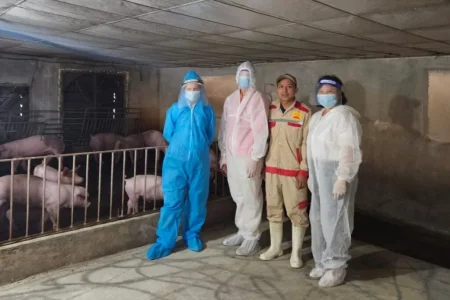Vietnam’s pig industry remains under pressure as African swine fever (ASF) continues to spread, threatening farmer livelihoods and disrupting supply chains nationwide. In response, a new alliance is reshaping how biosecurity is practices on smallholder farms.
The Vietnam National Innovation Alliance for Pig Biosecurity, launched in 2024, is a joint effort between Vietnam’s National Institute of Animal Sciences and Australia’s Aus4Innovation initiative.
Science-driven solutions
A the study—facilitated by Aus4Innovation and conducted by researchers from Vietnam’s National Institute of Animal Science, Australia’s Commonwealth Scientific and Industrial Research Organization, and Charles Sturt University—highlights how simple changes can dramatically reduce disease risk.
It focused on key practices of smallholder farms in Gia Lai, Dak Lak, and Quang Ngai provinces that increase disease risks.
The findings highlighted how simple interventions can significantly reduce disease risks. These include:
- ✅ Clean water access can reduce disease susceptibility by up to fivefold
- ✅ Quarantining pigs returning from markets lowers infection risk sixfold
- ✅ Basic hygiene—like cleaning boots and hands—can cut risk tenfold
These measures are low-cost and easy to implement, making them ideal for small farms with limited resources.
From research to action
To share these insights, the alliance hosted a consultation workshop on October 23. Participants included farmers, researchers, and industry associations. Together, they reviewed the study and discussed how to apply its findings
Key measures discussed included:
- ✅ Enforcing strict quarantine protocols for new or returning pigs
- ✅ Installing foot baths at pig pen entrances
- ✅ Controlling and managing visitor and worker access to pens
These discussions will help create clear, practical biosecurity guidelines that match local farm conditions to help farmers manage ASF and other threats more effectively.
Urgency and collaboration drive innovation
The Ministry of Agriculture and Environment reported 1780 ASF outbreaks across all 34 provinces this year, leading to the destruction of 648,000 pigs. With more complex viral strains emerging, the need for coordinated action is urgent.
Dr Pham Cong Thieu, head of Vietnam’s National Institute of Animal Sciences, stressed that collaboration is key. By involving farmers directly in the research process, the alliance ensures solutions are both relevant and sustainable.
CSIRO counsellor and Aus4Innovation Director Dr Kim Wimbush echoed this view, noting that innovation thrives when science meets local knowledge. The alliance, he said, is laying the groundwork for resilient pig farming across Vietnam.

